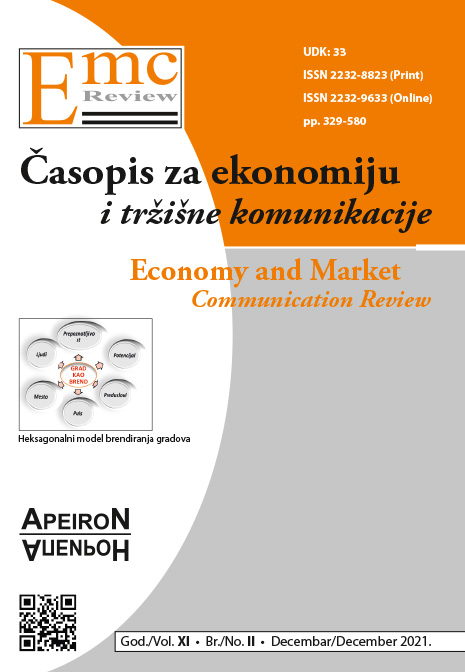SPECIFICS OF THE BRANDING AND COMMUNICATION PROCESS OF LUXURY HOTELS
DOI:
https://doi.org/10.7251/EMC2102417PAbstract
The aim of this paper is to present a complex branding process, and to present the framework of the branding concept on the example of luxury hotels. Tourism tries to provide people with what they want, within the framework of meeting the needs of travel, while branding gives a distinctive value in the market because of which the tourist will choose a specific destination, attraction or in this case the type of accommodation. The process of branding a hotel, like any other product and service, is a demanding and time-consuming process. However, the creation of a tourist brand, or in this case a hotel, is specific due to the characteristics of the tourist product, and these characteristics are: intangibility, inseparability, variability and transience. Although there are necessary steps that must not be avoided when forming a brand development strategy, taking all these steps does not mean creating a successful and recognizable brand in the market, but it certainly gives it a greater opportunity to become one. In this paper, a primary qualitative research was conducted through an in-depth interview that attempted to clarify branding steps on the example of two atypical examples of luxury hotels. A secondary survey was conducted through a questionnaire, which examined the success of the branding process of selected hotels in the general public as well as the effectiveness of hotel communication on websites and social networks. The survey also examined public perception of general associations associated with strong brands. The research showed that the respondents prefer branded hotel accommodation over the non-branded ones and that the respondents recognize the characteristics and advantages of luxury hotels. The answer to the research question about the steps of brand formation was obtained through in-depth interviews and confirms how hotels go through the same stages of brand formation. At the same time, research has shown that respondents prefer branded hotel accommodation to non-branded, that the logo and name of the hotel are sometimes, but sometimes not enough to recognize the type of hotel and that respondents recognize the characteristics and benefits of luxury hotels. The topic of luxury hotel branding provides further research opportunities that can significantly advance the luxury industry, as the demand for luxury goods will always exist. The topic of luxury hotel branding provides further research opportunities that can significantly advance this specific industry, given the growing interest in luxury hotels. This paper was created as part of the research for the final work of Stella Pleša at the undergraduate study of Tourism at the University of Vern‘.
